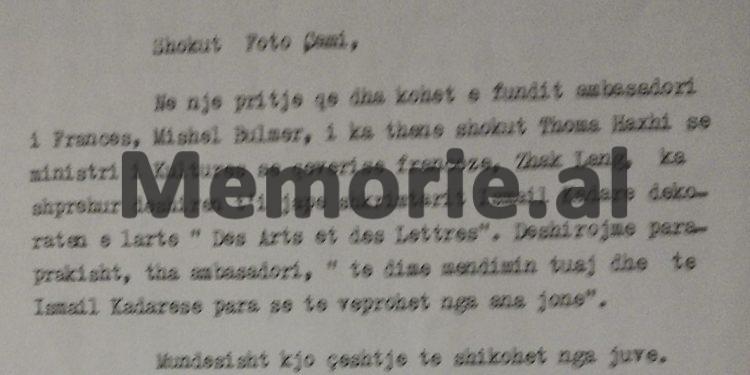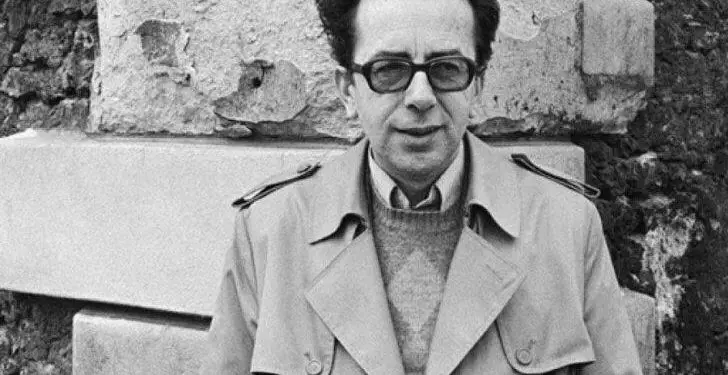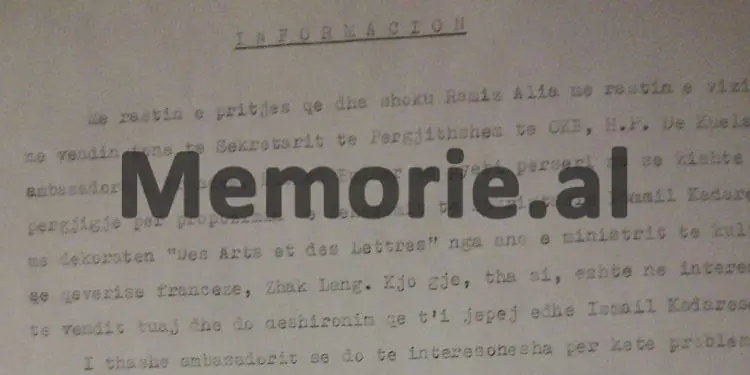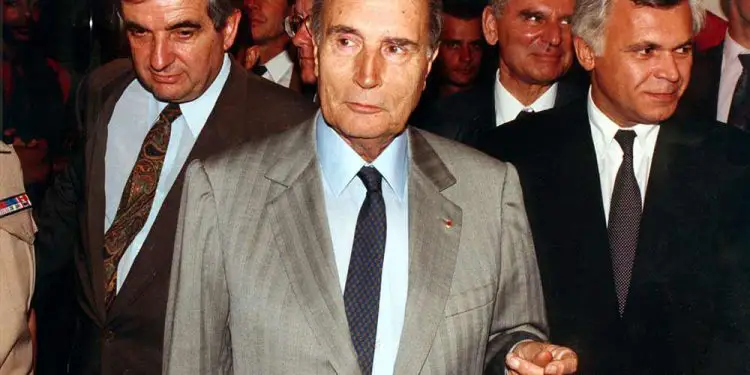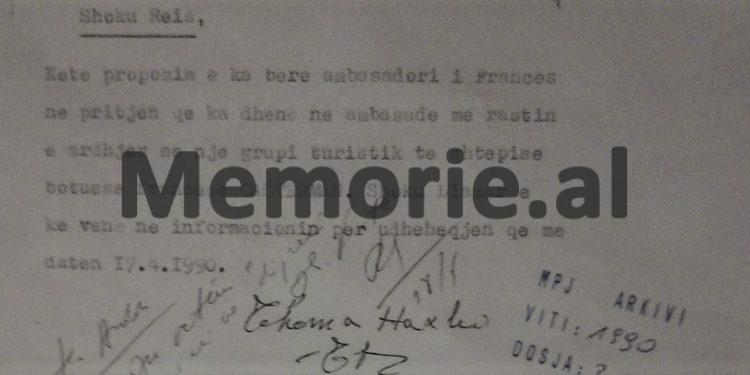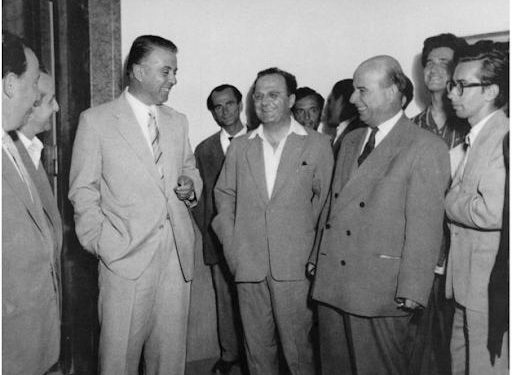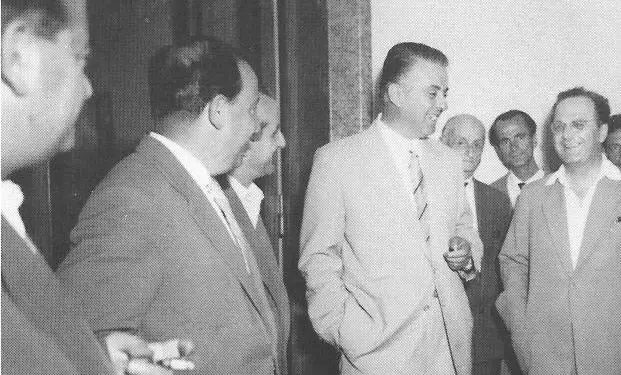Dashnor Kaloçi
The third part
Memorie.al publishes some archival documents extracted from the Archive of the Ministry of Foreign Affairs in Tirana, which belong to 1990, where there is a correspondence between the Albanian Embassy in Paris and the Ministry of Foreign Affairs in Tirana, where Albanian diplomats inform and inform their superiors in Tirana, where on the occasion of the reception given by Ramiz Alia on the occasion of the visit to our country of the UN Secretary General, Perez De Cuelar, the Ambassador of France, Michel Bulmer had asked if there were any response from the Albanian side to the proposal to decorate the writer Ismail Kadare with the decoration “Des Arts et des Lettres” by the Ministry of Culture of the French government, headed by Jacques Lang. Full correspondence between the Albanian Embassy in Paris and their superiors in Tirana regarding the proposal of the French state for the decoration of the famous writer Ismail Kadare with the high decoration.
In the mid-1950s, when the de-Stalinization process was under way in the Soviet Union, thanks to the newly ousted leader Nikita Sergeyevich Khrushchev and his supporters, a booklet began circulating somewhere in Italy, detailing the horrors of civil war (1918-1922), in that huge country where the October Revolution, which brought the Bolsheviks to power, had “triumphed”.
The book “Doctor Zhivago”, written as a pamphlet by Russian writer Boris Pasternak, was said to have been supported, funded and distributed by the US Secret Service (CIA), which wanted to make the world aware of what ‘cradle’ had emerged that ‘offspring’ of the Stalinist regime, which some of its protagonists and actors were unmasking and shouting at him.
After Italy, under the full care and patronage of the Americans (camouflaged under the Rockefeller Foundation), the book, which continued to amaze the world, managed to enter the Soviet Union itself. Thus, as Moscow’s Stalinist leadership tried to erase or “bring out” those horrors experienced by almost all the peoples living in all the USSR republics, the Americans “smuggled” them back inside.
And in the midst of all this American-sponsored ‘literary-political’ campaign, then Pasternak’s name and his book reached the top of the world, and the author was nominated for the Nobel Prize, which was awarded to him in 1958. Although under numerous pressures, he refused to receive the ‘Nobel Prize in Literature’, the American mission had already been accomplished at its best.
The Kremlin was boomeranged by this, as Pasternak’s refusal caused more commotion than it would have done if it had accepted the award. Likewise, almost at the same time that the Americans had launched the ‘Pasternak operation’, the communist leader of Yugoslavia, Josip Broz Tito, had come out ‘god himself’ to such an ‘action’ with the Bosnian Serb writer-politician Ivo Andric.
It is said that there was no official or private meeting where Marshall Tito himself did not speak and promote with his friends and guests the “genius” of the Slavic writer who “was shining with his work”, the whole world. A work describing “brotherhood-union” in that country with six multi-ethnic Balkan republics. And, thanks to the support of Tito’s promotion, Ivo Andri edhe also managed to be crowned with the ‘Nobel Prize in Literature’ in 1961, although the “union-brotherhood” which he ‘sang’ in his work, turned out to be just a façade , if we consider the wars that drowned in blood almost all of its republics in the early 1990s!
Full 15 years later (in 1985), a completely different story from that of Tito and Andric took place in Albania. She with the famous writer Ismail Kadare and the communist dictator Enver Hoxha and his successor Alia (the event has its origins when Enver was still alive).
While at that time France and personally President François Mitterrand, had undertaken the “action” to honor the Albanian writer Ismail Kadare, first with the ‘Legion of Honor’ (the highest decoration given by France), and then to nominate him as a candidate for the ‘Nobel Prize in Literature’, his own country, or rather the communist leadership, did not accept this at all.
Not only that, but official Tirana informed the French that: “In case France would take such an action unilaterally, then.”.
This and many other highly refined (typically communist) machinations are made known for the first time by these official documents (found in the archives of the Albanian state), which are published for the first time and in full in the pages of this book. .
As we have seen in several previous chapters of this book, regarding the fact that for years the French government encountered the rejection of official Tirana for its requests regarding the decoration of the famous writer Ismail Kadare, the French Minister of Culture, Jacques Lang , does not seem to have been “delivered” easily. After the beginning of May 1990, he instructed the French ambassador accredited in Tirana, Michel Bulmer, to remind the Albanian official authorities once again, his request for the decoration of the writer Ismail Kadare. Even asking them for an official answer before the French government starts the relevant procedures for decorating Kadare with “Des Arts et des Lettres”. And also about that, the writer Ismail Kadare himself should be informed and consulted.
It seems that the insistence and “non-surrender of weapons” by the French Minister of Culture who insisted on his request, most likely came from the well-known fact that about a year ago (July 1989), official Tirana gave Kadare permission to take part in the celebrations of the 200th anniversary of the French Revolution, where the famous Albanian writer was the special guest of President Francois Mitterenad, among 35 heads of state from around the world. Not only that, but thanks to Kadare, from all over the communist East, only Albania and Poland were represented.
Given this fact, given that Minister Jacques Lang has considered a formality, his request for the decoration of the Albanian writer, who in France was made “home” with his publications. But it seems that Jacques Lang was wrong in his “accounts”, because the politics and even more so that of a communist country like Albania, did not work as in mathematics “with the rule of three”.
This is clear from these archival documents that are published for the first time in the pages of this book, as the official request of the French government, the senior Albanian leadership headed by Ramiz Alia, has not even taken into account at all. He even left him completely silent, so much so that the Minister of Foreign Affairs, Reiz Malile, in the letter of his subordinates where they inform him about the request of the French government, he put the note “when was this proposal officially made” ?! And then he added that a letter was sent to Foto Çami, which was done by him, but no response came from the Central Committee.
It is not known exactly why no answer came from Foto Çami, when at that time many thought and created an image that: “Comrade Foto” was one of the leaders who supported and helped Kadare in the obstacles that occasionally brought him out. This may not have been realized due to the time factor, as according to official documents (see the relevant facsimile), the issue was dragged on until July, a time when the “senior leadership” was on vacation and this may have been left for to be discussed after the holidays in September.
But this never happened, as it is already known, Kadare left Albania in August and on October 24, 1990, he sought political asylum in France. However, these remained to be seen and around them can be shed light on the main characters and actors of those events, to illuminate them and highlight the truth. Like most of the documents in this book, these are published in full and without any abbreviations.
Continued from the previous issue
Report by diplomat Thoma Harxhi from the Albanian Embassy in Paris, sent to the Ministry of Foreign Affairs in Tirana
I N F O R M A T I O N
On the occasion of the reception given by Comrade Ramiz Alia on the occasion of the visit to our country of the UN Secretary General, Perez De Cuelar, the Ambassador of France, Michel Bulmer, asked me again if he had an answer to the proposal to decorate the writer Ismail Kadare with the decoration ” Des Arts et des Lettres” by the Ministry of Culture of the French government, Jacques Lang.
“This – he said – is in the interest of your country and we would like it to be given to Ismail Kadare as well.”
I told the ambassador that I would be interested in this issue and we would get back to you soon.
Tirana, on 14.5.1990
Th. Haxhi
Note from the Minister of Foreign Affairs, Reiz Malile
Note: When this proposal was officially made
Write a letter to your friend Photo
Reiz Malile
15.5.1990
Letter from diplomat Thoma Harxhi from the Albanian Embassy in Paris, to the Minister of Foreign Affairs, Reiz Malile
Comrade Reiz
This proposal was made by the Ambassador of France at the reception he gave at the embassy on the occasion of the arrival of a tourist group of the French publishing house CASTERMAN. Comrade Lazar has put it in the leadership information since 17.4.1990.
Thoma Haxhi
Note
Comrade Andon
You just inform your friend Photo
Letter of the Minister of Foreign Affairs, Reiz Malile, to the Secretary of the Central Committee of the ALP, Foto Çami
Comrade Foto Çami
In a recent reception given by the Ambassador of France, Michel Bulmer, told Comrade Thoma Haxhi that the Minister of Culture of the French government, Jacques Lang, has expressed the desire to give the writer Ismail Kadare the high decoration “Des Arst et of Letters ”. “We want to know in advance – said the ambassador – your opinion and that of Ismail Kadare before we act.”
Possibly this issue to be viewed by you. Memorie.al
Reiz Malile
Tirana, May 22, 1990





